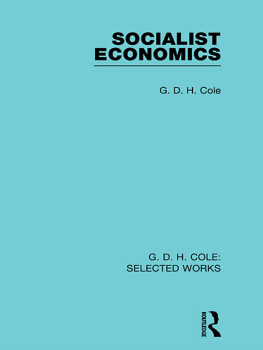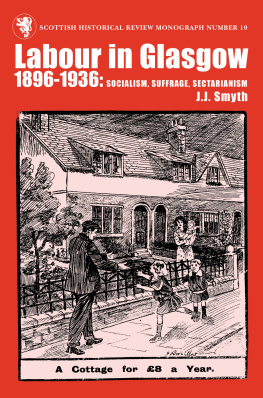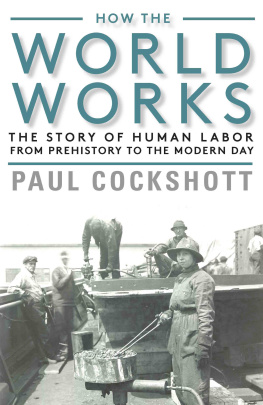Towards a new socialism
W. Paul Cockshott
and
Allin Cottrell
About this book
Towards a New Socialism was published in 1993 by Spokesman, Bertrand Russell House, Gamble Street, Nottingham, England, and printed by the Russell Press, Nottingham. The text is copyright W. Paul Cockshott and Allin Cottrell. This digital version was prepared by Allin Cottrell using LATEX. Besides pagination, it differs from the Spokesman printing only in respect of the correction of a few typographical errors and some minor reorganisation of Tables and Figures. No attempt has been made to update the book at this point.
Paul Cockshott (wpc@dcs.gla.ac.uk) currently works at the Turing Institute of the University of Glasgow, and Allin Cottrell (cottrell@wfu.edu) in the Department of Economics at Wake Forest University, North Carolina.
The authors wish to thank Maria Black, Ron Buchanan and Greg Michaelson for useful discussions of the ideas in this book. Allin Cottrell also wishes to acknowledge assistance in the form of research grants from Elon College, North Carolina, and the Kerr Bequest at the University of Edinburgh. ii
Introduction
Socialism has been tried. Seventy years after the Bolshevik revolution, historys verdict is that it has failed. All those still inclined to call themselves socialists in the 1990s are obliged to offer some response to this widely held view. This book is our response. It may be useful first, however, to distinguish our view from some responses to be found among the Left in the West.
Presumably, most socialists will wish to say that the sort of social system they seek is substantially different from the Soviet model. But the grounds for this claim may be various. The first distinction to make is between social democrats and those we might call idealist marxists. The former might argue that the failure of Soviet socialism has little to say about the future of, say, Scandinavian-style social democracy. This may be true. It so happens that the period of crisis of Soviet socialism has coincided with an onslaught on social democratic ideas and institutions, particularly although not exclusively in Britain and the USA, but one might argue that this connection is, if not fortuitous then at any rate less than logically necessary: even if the crisis of the Soviet system is terminal, that is, one can imagine the political pendulum swinging back towards social democracy in the West. As we shall see, however, there are some grounds for doubt on this score. Idealist marxists, on the other hand, tend to claim that failure in the Eastern bloc should not count against Marxism, since the Soviet system represented the betrayal rather than the realisation of Marxian ideals. While the social democrats say that Soviet socialism was not the kind of socialism they wanted, these marxists say that the USSR (post-Lenin, perhaps) was not really socialist at all. Social democrats may accept that the Soviet system was indeed Marxist, and they reject Marxism; idealist marxists cling to their theory while claiming that it has not yet been put into practice.
Our position is distinct from both of these views. First of all, we argue that social democracy sells short the historic aspirations of socialism; it represents an insufficiently radical solution to the ills of modern capitalist societies. In contrast to the social democrats, we believe that there is much of value in the classical Marxian project of radical social transformation. On the other hand, we reject the idealist view which seeks to preserve the purity of socialist ideals at the cost of disconnecting them from historical reality. We recognise, that is, that the Soviet-type societies were in a significant sense socialist. Of course, they did not represent the materialisation of the ideals of Marx and Engels, or even of Lenin, but then what concrete historical society was ever the incarnation of an Idea? When we use the term socialism as a social-scientific concept, to differentiate a specific form of social organisation by virtue of its specific mode of production, we must recognise that socialism is not a Utopia. It is quite unscientific to claim that because the Soviet system was not democratic, therefore it cannot have been socialist, or more generally to build whatever features of society one considers most desirable into the very definition of socialism. Our view can be summed up as follows:
- Soviet society was indeed socialist.
- This society had many undesirable and problematic features.
- The problems of Soviet society were in part related to the extremely difficult historical circumstances in which the Bolsheviks set about trying to build socialism, but that is not all: important policy mistakes were made (just as possible in a socialist society as in capitalism), and furthermore the problems of Soviet socialism in part reflect serious weaknesses in classical Marxism itself.
- The failure of the Soviet system is therefore by no means irrelevant to Marxian socialism. We must reflect carefully on the lessons to be learned from this failure.
- Nonetheless, unlike those who delight in proclaiming the complete historic rout of Marxism, we believe that a different type of socialismstill recognizably Marxian, yet substantially reformulatedis possible. The Soviet Union was socialist, but other forms of Marxian socialism are possible.
- This claim can be sustained only by spelling out in much more detail than hitherto both the sorts of economic mechanisms and the forms of political constitution which socialists consider both desirable and feasible. This we try to do in the book.
In this introduction, we begin to offer some answers to certain questions arising from these statements: Why is social democracy inadequate? In what sense was the USSR socialist? Insofar as the shortcomings of Soviet society arose from policy mistakes and lacunae in Marxist theory, what were those mistakes and lacunae? What is the basis for the claim that a revival of socialism is both possible and desirable? We cannot answer these large questions in any detail here; our intention is to sketch the outlines of answers, and to point forwards to the chapters which will flesh out the sketches.
Why is social democracy inadequate?
Social democracy has traditionally stood for a mixed economy, for the mitigation of the inequalities of capitalism by means of a system of progressive taxation and social benefits, for parliamentary democracy and civil liberties. At their most successful, social democratic parties have certainly succeeded in improving the conditions of the working classes, compared to a situation of unregulated capitalism; in Britain the National Health Service remains the most enduring monument to this sort of amelioration. Nonetheless very substantial problems remain.
First, capitalist economic mechanisms tend to generate gross inequalities of income, wealth and life-chances (as discussed in chapter 1), and social democracy has had little real impact on these inequalities, which have indeed worsened over the last decade or so. Only a radical change in the mode of distribution of personal incomes, such as that advocated in chapter 2, offers a real prospect of eliminating gross inequality. Secondly, the mixed economy is problematic in two important ways. In the mixed economies that have existed to date, the socialist elements have remained subordinated to the capitalist elements. That is, the commodity and wage forms have remained the primary forms of organisation of production and payment of labour respectively. Socialist activities have had to be financed out of tax revenue extracted from the capitalist sector, which has meant that the opportunities for expansion of welfare measures and the free distribution of basic services have been dependent on the health of the capitalist sector and the strength of the tax base. Only when the capitalist sector has been growing strongly have social democratic governments been able to deliver the goods. In this way, the capacity of social democratic governments to reshape the class structure of society has been inherently self-limiting: attempts at radical redistribution always threaten to destroy the engine of capitalist wealth-creation on which those governments ultimately depend.










